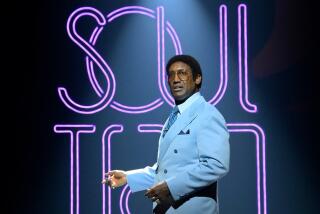‘Soul Train’ Creator Accuses MTV of Unfair Booking Rules
- Share via
MTV’s annual “Video Music Awards” program has become a big draw for music fans because it features performances by the hottest acts of the moment. But a competitor who also happens to be one of the biggest names in music television contends the channel’s tactics in booking talent are unfair.
Don Cornelius, creator and longtime producer of the televised music showcase “Soul Train,” says MTV has been pressuring African American artists not to appear on his “Lady of Soul Awards” program, which airs the same week as the “Video Music Awards.”
Cornelius, who launched “Soul Train” as a weekly series featuring black performers in 1970, said dissuading acts from performing on competing programs is “a misuse of power.”
“It’s anti-competitive behavior that needs to be addressed at the Federal Trade Commission level. Let me make myself perfectly clear. I’m not begging for a favor here,” Cornelius said. “This is a warning. If this particular media organization doesn’t stop pushing its weight around like this, I am going to file a complaint with the federal authorities against them.”
MTV officials acknowledged that they require acts to agree not to perform on a wide range of competing programs, from CBS’ “Late Show With David Letterman” to ABC’s “Live With Regis and Kelly,” during the 30 days preceding the cable channel’s awards show, which airs Sept. 6.
Executives at MTV, which maintains a hammerlock on the music-video business, said they make the same requirements of all performers and do not discriminate against black artists or use intimidation tactics.
“When we ask an artist to perform, no matter what genre, we’re very clear, saying, ‘Look, we have some appearance parameters that are important to us,’ ” said Tom Calderone, MTV’s senior vice president for music and talent. “We have to be protective of our awards show.”
This year, the rivalry focused on R&B; singer Alicia Keys. MTV said she had been booked to perform on the “Video Music Awards” since late June and had agreed not to play elsewhere in the weeks before the show.
Cornelius said he has tried numerous times without success to get her to perform on the “Lady of Soul” program, which is scheduled to air in Los Angeles on Sept. 2. Representatives for J Records, which released Keys’ album, could not be reached for comment Thursday.
Cornelius said the tension over artist performances was particularly troubling because of MTV’s early resistance to airing videos by black artists, and its increasing dominance.
“How can a pop channel that made a name for itself by openly banning videos by black artists during its early years now threaten African American acts with retribution if they choose to perform on a competing, black-owned media project such as ‘Soul Train’?”
MTV Networks, owned by media conglomerate Viacom Inc., has previously come under federal scrutiny for alleged antitrust violations. A Justice Department probe of Viacom’s acquisition of the Box, a small competing video channel, ended in December. Before that, regulators examined alleged antitrust problems related to MTV’s domination of Europe but took no action against the company.
MTV’s top competitor in rap and R&B; music, the Black Entertainment Television channel, was acquired by Viacom in January. Aside from a smattering of local programs and the syndicated “Soul Train,” which airs on KTLA-TV Channel 5 on Saturdays, MTV’s remaining competition in the U.S. consists of the smaller Much Music network.
Record companies, which use MTV to gain exposure for their artists in hopes of driving album sales, submit thousands of music videos each year and vie to have acts appear on non-video programs such as awards shows. Because various feeds of MTV are seen in more than 300 million homes worldwide, music industry executives complain that MTV has too much power in determining whether an album succeeds or fails.
Many executives lament the practice of blocking acts from performing on multiple shows, saying it may reduce an artist’s total audience. The practice is routine in the annual tug-of-war between the Grammy Awards and the American Music Awards, record executives say.
Cornelius said he has never required such agreements from acts that perform on “Soul Train” or the related awards programs. MTV said that booking acts that are gaining exposure elsewhere could reduce ratings for the video awards show.
“When you support and totally put your muscle behind an artist, you really want that big payoff, which is [to have them appear on] the ‘Video Music Awards,’ ” Calderone said. “When artists do other awards shows . . . it becomes difficult to differentiate show to show, and we have to be protective.”
Calderone said MTV had made such requirements of “Video Music Awards” performers for the last several years because of an increase in the number of competing programs airing in the late summer, including Fox’s “Teen Choice Awards.”
MTV lost out to the Fox show, for example, in the competition to book the pop duo of rapper Eve and Gwen Stefani, lead singer of the rock band No Doubt.
Before the debut of “Soul Train,” which started as a local program in Chicago and expanded to scores of markets nationwide, there was no TV outlet dedicated to performances by black acts.
MTV debuted in 1981, the first channel to show nothing but music videos. For at least two years after MTV’s launch, the channel was heavily criticized by music executives and acts such as Rick James for excluding videos by black artists.
MTV executives said at the time that they were interested only in rock music, a predominantly white genre. Two decades later, black music has become a rich profit center for the record industry and a key source of cachet for the cable outlet.
Cornelius said he finds MTV’s requirements especially ironic.
“It’s ridiculous for MTV to suggest this practice is ethical because they equally muscle artists of all races,” he said. “MTV certainly didn’t find equality a desirable approach back in its early years when it openly discriminated against black artists and refused to play their videos.”
More to Read
The biggest entertainment stories
Get our big stories about Hollywood, film, television, music, arts, culture and more right in your inbox as soon as they publish.
You may occasionally receive promotional content from the Los Angeles Times.









